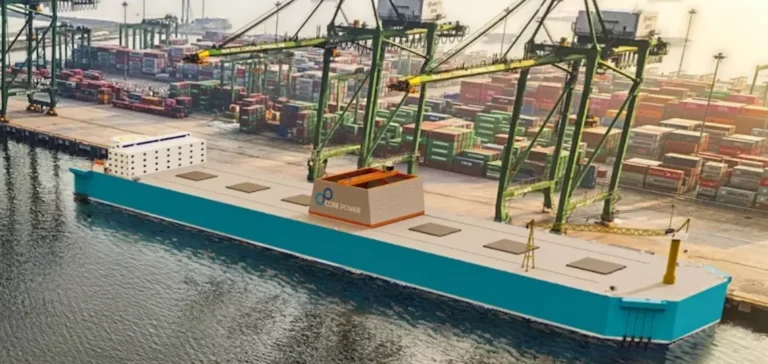The American Bureau of Shipping (ABS), in partnership with Core Power and Athlos Energy, is studying the feasibility of deploying Floating Nuclear Power Plants (FNPP) in the Mediterranean Sea. The project aims to address the specific energy requirements of islands, ports, and coastal communities facing electricity supply challenges and potable water shortages.
Objectives and applications of FNPPs
The partners’ research will examine various potential uses for these floating plants, including large-scale electricity generation for remote sites. Special attention will be paid to the decarbonisation of port infrastructures by providing emission-free energy. These facilities could also supply desalination plants to deliver potable water to regions frequently affected by drought conditions.
According to Core Power, nuclear energy is particularly well suited to support energy demand across various sectors, including electricity, industry, maritime and land transportation. The British company, specialised in nuclear technologies, further indicated these installations would optimise electrical grid reliability and contribute to the decarbonisation of the relevant economies.
Regulatory framework and preliminary studies
In October 2024, ABS published the industry’s first comprehensive set of requirements for floating nuclear power plants, now serving as a reference for sector stakeholders. As part of the current project, the ABS Global Ship Systems Centre will conduct a PESTLE (Political, Economic, Social, Technological, Legal, and Environmental) study with several key stakeholders. The study aims to assess FNPP adaptability to the specific energy needs of the islands in the Aegean Sea.
The main output of this partnership will be an open-access white paper targeted at industry actors, policymakers, and government authorities. It will also include a visual map highlighting potential locations for future floating plants.
Industrial and technological prospects
Meanwhile, Core Power is developing the US-based “Liberty” programme, planning the commercial launch of floating nuclear power plants by the mid-2030s. The programme initially involves mass production of FNPPs for the civilian maritime sector. In the long term, it should also facilitate the integration of advanced nuclear technologies into commercial ship propulsion.
Last November, Core Power and Westinghouse announced an agreement to advance the design of a floating plant equipped with Westinghouse’s eVinci microreactor. This partnership also includes the development of a regulatory framework adapted specifically to floating nuclear systems.
For Athlos Energy, a Greek company established in 2024 to promote nuclear energy in Greece, this study marks a significant initial step in practically evaluating the deployment possibilities of FNPPs in the Aegean region. The country, facing complex energy questions, is again seriously considering the nuclear option as part of its energy mix.






















